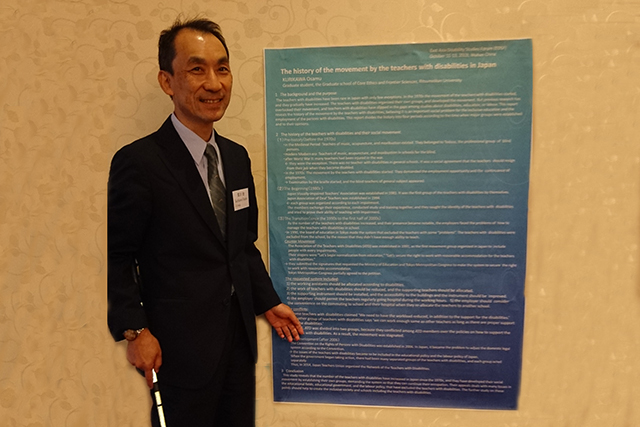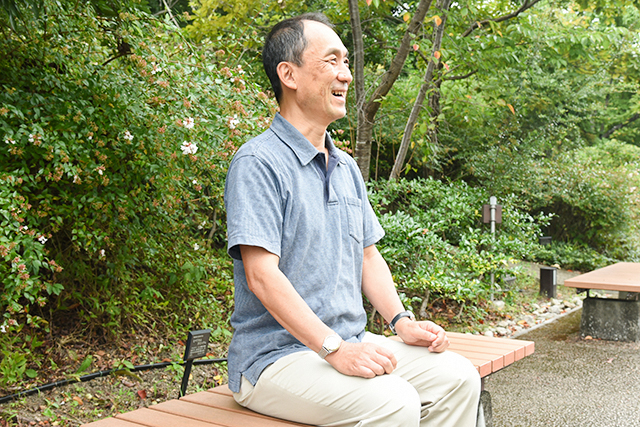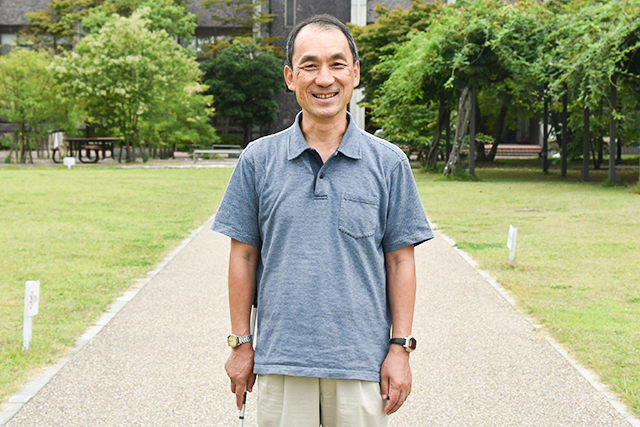Never give up what you want to do even if you have a disability:Shedding light on the history the teachers with disabilities rights movement
"The attitude I value is doing what I want to do rather than choosing to give up because I have a disability.” These are the words of Osamu Kurikawa, a fourth-year student in the Graduate School of Core Ethics and Frontier Sciences. While teaching at a public high school, Kurikawa entered the Graduate School of Core Ethics and Frontier Sciences in 2018 and began conducting research on the history of the disability rights movement. In 2020, he conducted research on the Anezaki Library, which is considered to be Japan's oldest existing Braille library, for the "100th Anniversary of the Founding of the Niigata Prefecture Welfare Association for the Visually Impaired and Japan Braille Library" published by the same Association, and in the course of his research, he succeeded in uncovering the unknown achievements and personality of its founder, Sojuro Anezaki. For this interview, we spoke to Mr. Kurikawa, who is devoting himself to his research in order to clarify the big picture of the history of the teachers with disabilities rights movement and the Braille library movement.

A sudden turning point
After graduating from college, Kurikawa began working for a public high school in Niigata Prefecture; however, he lost his sight in his late twenties due to a disorder called retinitis pigmentosa. He was transferred to a school for the blind, where he continued to teach in spite of his visual impairment. He was able to work at the school for the blind without any inconveniences thanks to the support of his understanding colleagues, but he requested to be transferred and started working at a regular high school in 1993 because he wanted to lead a normal life in society instead of in a “special place.” While working as an advisor for the volunteer club and the chorus club, he was also active in a disability rights movement group with teachers with disabilities who were facing various struggles.

Then, a turning point came for Kurikawa. In 2017, on his way back from Tokyo where he had joined a national meeting of the Network of Teachers with Disabilities, he received a proposal from Masaya Nakamura, who was conducting research on teachers with disabilities at the Graduate School of Core Ethics and Frontier Sciences. “He told me there will be an interesting event at Ritsumeikan's Tokyo Campus and asked me to go with him. When I went to the campus, I found that an information session for graduate school admissions was being held there. I wasn't fooled per se, but I was surprised," says Kurikawa with a smile. Although he was confused by the sudden turn of events, it rekindled his desire to pursue research at graduate school, which he had held when he was a student, so he decided to take the entrance exam.
Remembering those who came before me
Mr. Kurikawa was admitted to the graduate school, but he had trouble deciding what direction to take with his research was taking. “I wanted to deepen my understanding of what constitutes disability, but I couldn't decide on a detailed direction," he said. After six months of worrying, he came up with the answer. He would focus on the history of the teachers with disabilities rights movement. “When I looked back on my life, the activities I undertook with older teachers who have disabilities and friends who are teachers with disabilities came to mind," he explained.

His decision was based on the value he places on those who came before him. “In the 1960s, people with disabilities were not even allowed to take the teacher’s examination. In the 1970s, a movement was launched to make Braille examinations a reality, but there were still many people who were disappointed that the door was not open to them. In spite of their best efforts, there were many people who were relieved from their teaching duties due to disabilities they suffered in the middle of their careers or who died from overwork. I decided that I will never forget the sorrow, anger, anguish, and joy of my predecessors and would devote myself to research.” According to Kurikawa, this is when his research began in earnest.
Uncovering the life of Anezaki Sojuro, the founder of the Japan Braille Library
In 2020, while pursuing his research at Ritsumeikan University, Kurikawa was tapped to conduct research on the Anezaki Library, which is considered to be Japan's oldest existing Braille library, for a special publication commemorating the 100th Anniversary of the Founding of the Niigata Prefecture Welfare Association for the Visually Impaired. Deciphering documents from the Taisho era (1912-1926), which differ from modern texts, and examining unknown materials was extremely difficult, but with the help of the staff of the Disability Resource Center at Ritsumeikan University and student supporters, his work on the project gradually progressed. In the course of this research, Kurikawa was able to interact more with the younger generation and develop a good mutually stimulating relationship with them. As a result of his painstaking work, he was able to bring to light the previously unknown achievements and personality of Sojuro Anezaki, the founder of the Anezaki Library.
Shedding light on the history of the teachers with disabilities rights movement
“I am able to continue my research thanks to the kind understanding and cooperation of the people around me,” states a grateful Kurikawa, who is working hard to complete his doctoral dissertation. “Many of the people who struggled in the 1970s are now old and have few opportunities to talk about their experiences. That is why I would like to collect and analyze the records of the movement of my predecessors as soon as possible, so that I can shed light on the entire history of the teachers with disabilities rights movement and leave a record for future generations,” he explains. In this way, Kurikawa is striving to open up a new area of research, and his challenge is sure to continue into the future.

Profile
Osamu Kurikawa, 4th year student, Graduate School of Core Ethics and Frontier Sciences
Graduated from the Department of Philosophy in the First Faculty of Letters, Waseda University. Research Fellow (DC1), Japan Society for the Promotion of Science. His hobby is choral singing. From elementary school up through high school, he was in brass band, and in university, he was a member of the glee club. He is currently a member of a citizen’s chorus in Niigata Prefecture. He has served as the Secretary General of the Japan Visually Impaired Teachers Association, an expert member of the Cabinet Office’s Commission on the Policy for Persons with Disabilities, and a member of the Niigata City Council on the Policy for Persons with Disabilities. He is currently engaged in job placement support activities for teachers with disabilities.




